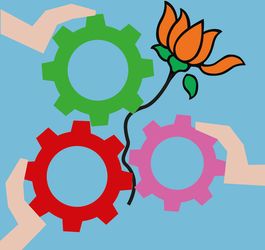During his ongoing shuttle diplomacy to unite non-Congress opposition parties to fight Narendra Modi in 2024, Telangana Chief Minister K. Chandrashekar Rao has flown over many peninsular rivers. Even though the flights were smooth, on the ground, the rivers have become political disputes.
The central government is pushing hard for a Rs80,000 crore project to link six rivers—four major and two smaller—flowing through nine states. The project report says the Godavari-Cauvery river linking would transfer surplus waters from Godavari basin to the Krishna basin (benefiting Telangana and Andhra Pradesh) and the Cauvery basin (helping Tamil Nadu). But some of the riparian states—Telangana surprisingly among them—have strong objections. Only Andhra Pradesh and Tamil Nadu are ecstatic as they can develop dry regions chronically short of water.
The riparian states have had bitter battles over sharing of Godavari, Krishna and Cauvery waters. Justice A.M. Khanwilkar of the Supreme Court is currently inquiring about the dispute over the sharing of the Mahanadi river between Chhattisgarh and Odisha. As the Mahanadi basin overlaps the Godavari basin, both Chhattisgarh and Odisha also have a say in the Godavari-Cauvery linking project. Though Kerala and Puducherry are part of the Cauvery basin, their opinion is not asked for, as they gain or lose nothing. Similarly, Maharashtra, where Godavari is a major river and Krishna flows through, has been kept out of initial consultations.
Modi, who got the river linking project launched last year by persuading the BJP governments in Uttar Pradesh and Madhya Pradesh to agree to link the Ken and Betwa rivers to irrigate the parched Bundelkhand region, has a bigger job on Godavari-Cauvery linkage. BJP-ruled Karnataka has raised serious objections as its irrigation needs in the north are met by the Krishna and in the south by Cauvery.
Rao’s Telangana Rashtra Samithi is at odds with the BJP-ruled Centre and the YSR Congress-ruled Andhra Pradesh. The Congress is in power in Chhattisgarh and it is anathema to Rao. Odisha’s Naveen Patnaik, after he broke the alliance with the BJP, has steered clear of national politics. Among the regional parties wooed by Rao are the Shiv Sena and the Nationalist Congress Party; both are in alliance with the Congress. Tamil Nadu’s Dravida Munnetra Kazhagam is a long-time electoral partner of the Congress.
While waters can be either harmoniously or contentiously shared, the problem with the federal front is that there are no votes to transfer among regional parties. The other regional parties Rao is pursuing—the Trinamool Congress, the Communist Party of India (Marxist) in its Kerala bastion, the Aam Aadmi Party, the Samajwadi Party and the Janata Dal (Secular)—cannot exchange votes with the TRS. A post electoral coalition, too, would depend on whether the BJP is defeated in many states, and the seat share of regional parties, reflecting the hung Parliament of 1996.
Then, the regional parties together matched the strength of the BJP, the single largest party, which propelled H.D. Deve Gowda of the Janata Dal (Secular) to prime ministership. But, the general elections are two monsoons away, and both the river levels and voter moods could fluctuate and have a bearing on Rao’s mission.
sachi@theweek.in


